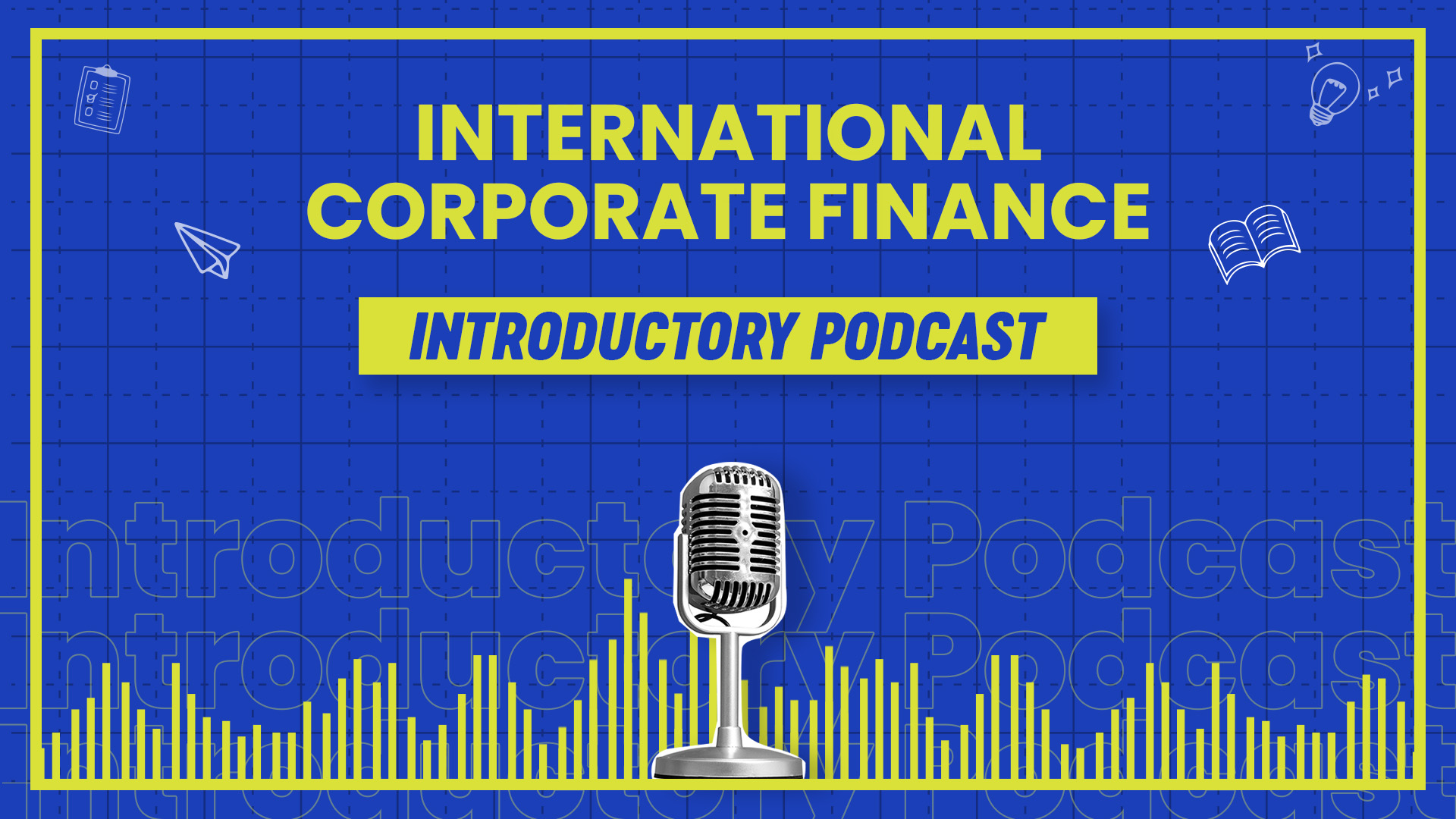Award in International Corporate Finance
The International Corporate Finance module is designed to provide students with a comprehensive understanding of the principles and practices used by global corporations.
-
OrientationDirector’s Introduction03:27Orientation10:52Understanding Podcasts01:46Understanding Pre-recorded Lectures02:25Understanding Pre-recorded Interviews01:54Understanding Case Studies01:47Understanding Discussion Boards02:30Ascencia Style SheetAI PolicyPolicy for Online Interaction and Behaviour for E-Academic Students
-
Coursework: International Corporate FinanceIntroductory Podcast00:04:13Assignment Podcast00:04:57
-
Introduction to the Financial System; Lecture 1Lecture: Introduction to the Financial System00:12:34Journal Article: What Constitutes a Financial System in General and the German Financial System in Particular?Introduction to the Financial SystemPodium Lecture: Definition of Finance, Master Theoretical and Practical Understanding of Financial Management in Multinational Companies, Understand and Prepare Appropriate Policies in Financial Management00:45:20Journal Article: The Role of the Financial System in Development
-
Introduction to the Financial System; Lecture 2Podium Lecture: Principles of Finance, Master Knowledge of the Financial Mechanisms of the Modern Economy, Understand and Prepare Different Forms of Business and Choose the most Appropriate One00:33:45Journal Article: Financial System and Modern Monetary Mechanism
-
Introduction to the Financial System; Lecture 3Podium Lecture: Different Forms of Business Entities, Master Knowledge of the Accounting and Legal Mechanisms of Modern Business, Understand and Prepare Different Forms of Business and Choose the Most Appropriate One00:55:54Journal Article: The New Business Entities in Evolutionary PerspectivePodium Lecture: The Architecture and Authority of International Institutions00:24:19Journal Article: What New Architecture? International Financial Institutions and Global Economic Order
-
Introduction to the Financial System; Lecture 4Podium Lecture: Markets and Their Structure, Master Knowledge of the Financial Mechanisms of the Modern Economy, Prepare Appropriate Policies to Operate in Different Markets00:31:49Journal Article: The Social Business - The Viability of a New Business Entity Type
-
Introduction to the Financial System; Lecture 5Podium Lecture: Definition of Capital, Master Knowledge of the Financial Reportings and their main Components, Choose Appropriate Methods to Hedge Business Risks01:16:00Journal Article: The Financial Reporting Environment
-
Financial Analysis; Lecture 6Podium Lecture: Financial Analysis: Introduction00:47:07Lecture: Part 1: Financial Tracking and Reporting00:57:55Lecture: Part 2: Financial Tracking and Reporting00:20:52Journal Article: Introduction to Dynamic Financial Analysis
-
Financial Analysis; Lecture 7Podium Lecture: The Analysis of the Balance Sheet, Master Knowledge of Investments and Capital Flows, Proficiently Manage Analytical Financial Tools to Conduct Business Analysis and to Communicate Reasons for Business Decisions01:06:49Journal Article: A Balance Sheet Approach to Financial CrisisGuest Interview: Nick Xuereb00:44:19
-
Financial Analysis; Lecture 8Podium Lecture: The Analysis of the Income Statement, Critically Appraise Financial Risks, Proficiently Manage Analytical Financial Tools to Conduct Business Analysis and to Communicate Reasons for Business Decisions00:42:56Journal Article: Identifying Decision Useful Information with the Matrix Format Income Statement
-
Financial Analysis; Lecture 9Podium Lecture: Liquidity Analysis, Critically Appraise Cash Flow Risks, Proficiently Manage Analytical Financial Tools to Conduct Business Analysis and to Communicate Reasons for Business Decisions00:30:26Journal Article: The Empirical Analysis of Liquidity
-
Budget, Revenue and Expenses; Lecture 10Podium Lecture: Part 1: The Budget: Definition, Master Knowledge How to Finance Business Operations, in Particular Multinational Operations, and International Tax Problems, Perform Forecasting Analysis00:31:44Podium Lecture: Part 2: The Budget: Definition, Master Knowledge How to Finance Business Operations, in Particular Multinational Operations, and International Tax Problems, Perform Forecasting Analysis00:27:02Journal Article: Business Operations Risks and Financial Power
-
Budget, Revenue and Expenses; Lecture 11Podium Lecture: The Forecasting Methods for Revenues and Expenses, Master Theoretical and Practical Knowledge of Fixed and Variable Costs, Economies of Scale, Break Even Analysis, Perform Forecasting Analysis00:35:16Journal Article: Deferred Revenues and the Matching of Revenues and Expenses
-
Budget, Revenue and Expenses; Lecture 12Lecture: Net Present Value00:17:43Net Present ValueJournal Article: A Refresher on Net Present ValuePodium Lecture: Working Capital Management, Master Theoretical and Practical Knowledge of the Fundamental Concepts of Finance, in Terms of Working Capital Management, and Capital Budgeting00:47:24Journal Article: An Analysis of Working Capital Management ResultsPodium Lecture: Master Theoretical and Practical Knowledge of Financial Concepts Including Budgeting, Forecasting and Financial Modelling in Order to Effectively Manage Financial Resources and Investments on a Global Scale00:44:40Podium Lecture: Provide Consultation Advice to Clients to Help them Think Through Where to Best Deploy their Capital to Manage their Portfolio Businesses, Drive Competitive Advantage and Increase Returns01:00:40Journal Article: New Product Portfolio Management
-
Budget, Revenue and Expenses; Lecture 13Podium Lecture: Time Value of Money, Critically Analyze and Evaluate Investments and Cross - Border Investments, Proficiently Manage Financial Tools for Decision Making00:42:43Journal Article: The Time Value of Money Concept in Islamic FinanceLecture: Part 1: Cross-Border Payment Systems01:04:16Lecture: Part 2: Cross-Border Payment Systems00:50:11Journal Article: Implementing Blockchain for Secure and Efficient Cross-Border Payment SystemsLecture: Part 1: Impact Investing and Sustainable Finance01:04:12Lecture: Part 2: Impact Investing and Sustainable Finance01:14:03Lecture: Part 3: Impact Investing and Sustainable Finance00:27:10Journal Article: Impact Measurement and Management in Sustainable Finance
-
Valuations; Lecture 14Lecture: Valuations00:22:20Journal Article: The Impact of Passive Investing on Corporate ValuationsValuationsPodium Lecture: Valuing Stocks, Critically Analyze and Evaluate Investments and Cross - Border Investments, Strategically Employ Practical Skills in Financing Multinational Operations and Projects00:41:31Journal Article: Stock Valuation and Learning About ProfitabilityLecture: Income Based Approach Used for Company Valuations00:15:11Journal Article: Are Stocks Overvalued?Income Based Approach Used for Company Valuations
-
Valuations; Lecture 15Podium Lecture: Valuing Bonds, Critically Analyze and Evaluate Investments and Cross - Border Investments, Strategically Employ Practical Skills in Financing Multinational Operations and Projects00:38:40Journal Article: Valuing Bonds
-
Valuations; Lecture 16Lecture: Fixed Income Securities and Bonds01:22:20Journal Article: On the Valuation Skills of Corporate Bond Mutual FundsFixed Income Securities and BondsPodium Lecture: Investment Rules, Master Knowledge of Foreign Exchange Markets and Risks, Strategically Employ Practical Skills in Financing Multinational Operations and Projects00:43:10Journal Article: Factors Affecting the Valuation of Corporate Bonds
-
Modern Financial Systems; Lecture 17Lecture: Modern Financial Systems01:35:27Lecture: Part 1: Accounting and Automation Software01:18:53Lecture: Part 2: Accounting and Automation Software00:51:12Journal Article: The Origins of Money and the Development of the Modern Financial SystemLecture: Virtual Currencies and Blockchain Technologies00:48:31Journal Article: Trends in Crypto-Currencies and Blockchain TechnologiesLecture: Business Intelligence (BI) and Analytics Software00:54:47Journal Article: Business Intelligence and Analytics. Research Directions
The International Corporate Finance module is designed to provide students with a comprehensive understanding of the principles and practices used by global corporations. This program aims to give students an understanding of and an appreciation for ways that financial information is prepared and how this information can be used to improve the quality of decision-making. This course will examine the interplay between economic, political and cultural factors in the international business environment, and how these impact financial decision-making. Students will be encouraged to apply theoretical concepts to real-world case studies and simulated financial problems, and to develop critical thinking skills in analysing global financial issues.
Programme Outcomes
- Upon completion of the module, students will be equipped with the knowledge and skills required to analyse and evaluate financial decisions in a global context, and to effectively participate in the financial management of multinational corporations.
- MQF/EQF Level 6 qualification. However, students’ circumstances and experiences may also be considered during the application process—five years of relevant working experience in the industry of specialization.
- Proof of B2 level of English should be provided by the students upon application – IELTS level/grade 6 or the student’s country equivalent.
- A Bachelor’s degree or graduate degree in humanities, sciences, human resources, organisational behaviour, business, administration, management, communication, journalism, psychology, arts or a related field.
- Minimum 180 ECTS at MQF/EQF Level 6 previously acquired at a Higher Education institution.
- Outstanding written and oral communication skills.
- A minimum of one year of work experience in a business environment will be considered as an asset.
Course Syllabus Podcast
Gain a Comprehensive Understanding of the Course Syllabus with Our Informative Podcast.
- Multiple-choice quiz - 25%
- Case study - 75%
- Eportfolio
- You can submit your assessment at any time during the course.
What’s included
-
Duration :Full Time - 3 Months
Part Time - 6 Months - Learning: 171 +Hours
- Certificate

